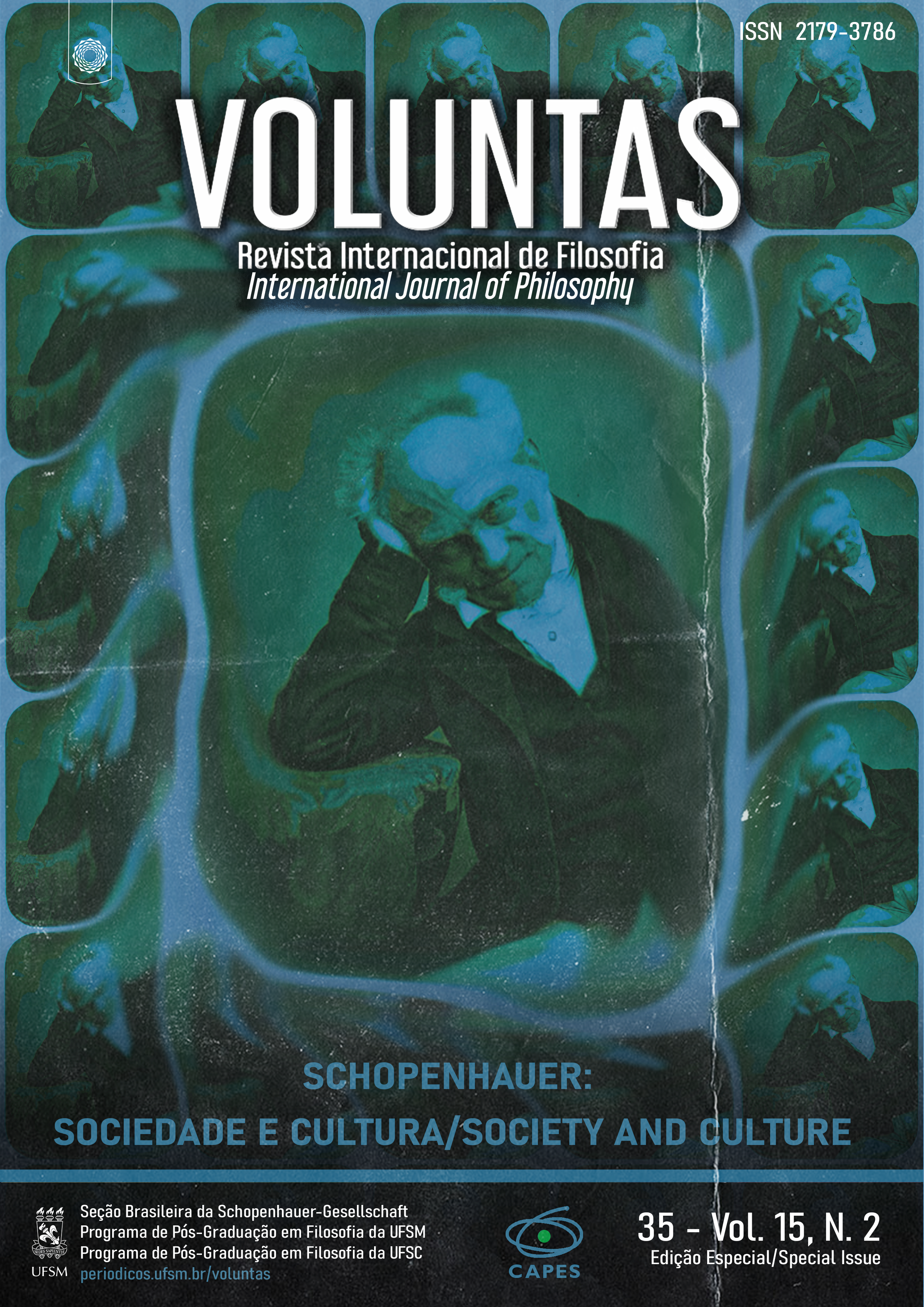On the logic of Schopenhauerian pessimism: a layout of his argumentative plan and directions for a critical analysis
DOI:
https://doi.org/10.5902/2179378688194Schlagworte:
Arthur Schopenhauer, Pessimism, Argumentative analysisAbstract
Arthur Schopenhauer is predominantly considered a kind of arch-pessimist and founder of the movement classified as "modern philosophical pessimism," due to his innovative claim to maintain, in a systematic way and on “objective reasons”, that non-being is better than being. However, two other groups of scholars follow different directions. One of them does not deny Schopenhauer's pessimism but attributes it especially to subjective reasons, such as his melancholic behavior. The other group does not even consider Schopenhauer as a pessimist, but, on the contrary, as an optimist, an indication that we lack clear and explicit criteria for understanding what Schopenhauerian pessimism would be. I argue that there is, indeed, a pessimistic "logic" objectively articulated within Schopenhauer's philosophy, and that therefore we must examine Schopenhauerian pessimism according to the philosophical reasons that make up his argumentative plan. To support this hypothesis, my first objective is to outline such a plan, following an informal model of the argumentative analysis. This approach also guides a more reflective critical assessment of his pessimistic "logic". Thus, the second objective is to introduce some parameters for further evaluation of the argumentative reach of Schopenhauerian pessimism.
Downloads
Literaturhinweise
Barboza, J. (2015) Schopenhauer: A decifração do enigma do mundo. São Paulo: Paulus.
Bazardjian, R. (1909) Schopenhauer, der Philosoph des Optimismus. Leipzig: G. Fock.
Beiser, F. C. (2016) Weltschmerz. Pessimism in German Philosophy, 1860-1900. New York: Oxford University Press.
Debona, V. (2020) A outra face do pessimismo: caráter, ação e sabedoria de vida em Schopenhauer. São Paulo: Loyola.
Fellmann, F. (2012) Warum sich in Schopenhauers schlechtester aller möglichen Welten gut leben lässt. Schopenhauer-Jahrbuch, Band. 93: 515-524.
Fischer, K. (1897) Der Philosoph des Pessimismus. Ein Charakterproblem. Heidelberg: Winter.
Freitas, M. S. (2023) Razões do pessimismo: estudos para uma interpretação geral do pessimismo filosófico à luz de Schopenhauer, Eduard von Hartmann e Matias Aires. 2023. 234 p. Dissertation (Doctorate in Philosophy) - Universidade Federal de Sergipe. São Cristóvão, 2023.
Hannan, B. (2009) The Riddle of the World: A Reconsideration of Schopenhauer's Philosophy. Oxford: Oxford University Press.
Hansen, H. V; COHEN, D. H. (2011) Are there methods of informal logic? OSSA Conference Archive. 15.
Holingdale, R. J. (1970) Introduction. In: SCHOPENHAUER, A. Essays and Aphorisms. Penguin Books: London.
Horkheimer, M. (1971) Pessimismus heute. In: Schopenhauer-Jahrbuch. Band. 52: 1-7.
Ingenkamp, H. G. (2012) Nicht-Sein oder Nicht-So-Sein? Eudaimonologie und Eschatologie bei Schopenhauer. Schopenhauer-Jahrbuch, Band. 93: 31-41.
Invernizzi, G. (1994) Il pessimismo tedesco dell'ottocento. Schopenhauer, Hartmann, Bahnsen e Mainlander e i loro Avversari. Firenze: La Nuova Italia.
Janaway, C. (1999) Schopenhauer's Pessimism. In: JANAWAY, C. (Org.). The Cambridge Companion to Schopenhauer. England: Cambridge University Press: 318- 343.
Kienpointner, M. (1987) Towards a typology of argumentative schemes. In: EEMEREN; GROOTENDORST; BLAIR; WILLARD (Eds.) Argumentation: Across the lines of discipline. Dordrech: Foris.
Magee, B. (1997) The Philosophy of Schopenhauer. New York: Oxford University Press.
Malter, R. (2009) Il pessimismo: un concetto critico. In: FAZIO, D.; KOSSLER, M.; LÜTKEHAUS, L. La scuola di Schopenhauer: testi e contesti. Lecce: Pensa Multimedia: 624-635.
Moraes, D. (2017) O pessimismo moral schopenhaueriano. Ethic@. Florianópolis, Santa Catarina, Brasil, v. 16, n. 2, nov.: 347-374.
Rosset, C. (1967) Schopenhauer, philosophe de l'absurde. Paris: PUF.
Schopenhauer, A. (1911a) Die Welt als Wille und Vorstellung. Erster Band. In: DEUSSEN:. (Hrsg). Sämtliche Werke. Bd 1. München: Piper Verlag, 1911. (Schopenhauer im Kontext III: Werke, Vorlesungen, Nachlass und Briefwechsel auf CD-ROM - Release Jan. 2008).
Schopenhauer, A. (1911b) Die Welt als Wille und Vorstellung, Ergänzungen . In: DEUSSEN:. (Hrsg). Sämtliche Werke. Bd 1. München: Piper Verlag. (Schopenhauer im Kontext III: Werke, Vorlesungen, Nachlass und Briefwechsel auf CD-ROM - Release Jan. 2008).
Schopenhauer, A. (2014a) Parerga and Paralipómena. Volume I. Translation by Sabine Roehr and Christopher Janaway. New York: Cambridge University Press.
Schopenhauer, A. (2014b) Parerga and Paralipómena. Volume II. Translation by Adrian Del Caro and Christopher Janaway. Cambridge: Cambridge University Press.
Schopenhauer, A. (1911c). Parerga und Paralipomena. In: DEUSSEN, P (Hrsg). Sämtliche Werke. Bd IV. München: Piper Verlag. (Schopenhauer im Kontext III: Werke, Vorlesungen, Nachlass und Briefwechsel auf CD-ROM - Release jan. 2008).
Schopenhauer, A. (1911d) Sämtliche Werke. Bd 1. München: Piper Verlag. (Schopenhauer im Kontext III: Werke, Vorlesungen, Nachlass und Briefwechsel auf CD-ROM - Release Jan. 2008).
Schopenhauer, A. (1969a) The World as Will and Representation, Volume I. Translation by E. F. J. Payne. New York: Dover Publications.
Schopenhauer, A. (1969b) The World as Will and Representation, Volume II: supplements to the four books of the first volume. Translation by E. F. J. Payne. New York: Dover Publications.
Schwantje, M. (1912) Der Pessimismus in der Ethik. In: Erstes Jahrbuch der Schopenhauer- Gesellschaft: 58-60.
Shapshay, S. (2019) Reconstructing Schopenhauer's Ethics. Hope, Compassion, and Animal Welfare. New York: Oxford University Press.
Stäglich, H. (1951/1952) Zur Geschichte des Begriffs Pessimismus. In: Schopenhauer-Jahrbuch. Bd. 34: 27-37.
Toulmin, S. (2003) The Uses of Argument. Updated Edition. Cambridge: Cambridge University Press.
Walton, D; Reed, C. Macagno, F. (2008) Argumentation Schemes. Cambridge: Cambridge University Press.
Wendel L, G. (1912) Schopenhauer als Optmist. Erstes Jahrbuch der Schopenhauer-Gesellschaft: 27-37.
Downloads
Veröffentlicht
Zitationsvorschlag
Ausgabe
Rubrik
Lizenz
Copyright (c) 2024 Matheus Silva Freitas

Dieses Werk steht unter der Lizenz Creative Commons Namensnennung - Nicht-kommerziell - Weitergabe unter gleichen Bedingungen 4.0 International.
Die Einreichung von Originalen an diese Zeitschrift impliziert seitens der Autoren die Übertragung der Rechte zur gedruckten und digitalen Veröffentlichung. Die Urheberrechte für die publizierten Artikel liegen beim Autor, wobei der Zeitschrift das Recht zur Erstveröffentlicheng zukommt. Die Autoren dürfen dieselben Resultate in anderen Publikationen verwenden, wenn sie deutlich auf unsere Zeitschrift als ursprüngliches Publikationsmedium hinweisen.
Lizenz
Creative Commons Namensnennung - Nicht-kommerziell - Weitergabe unter gleichen Bedingungen 4.0 International (CC BY-NC-SA 4.0).






